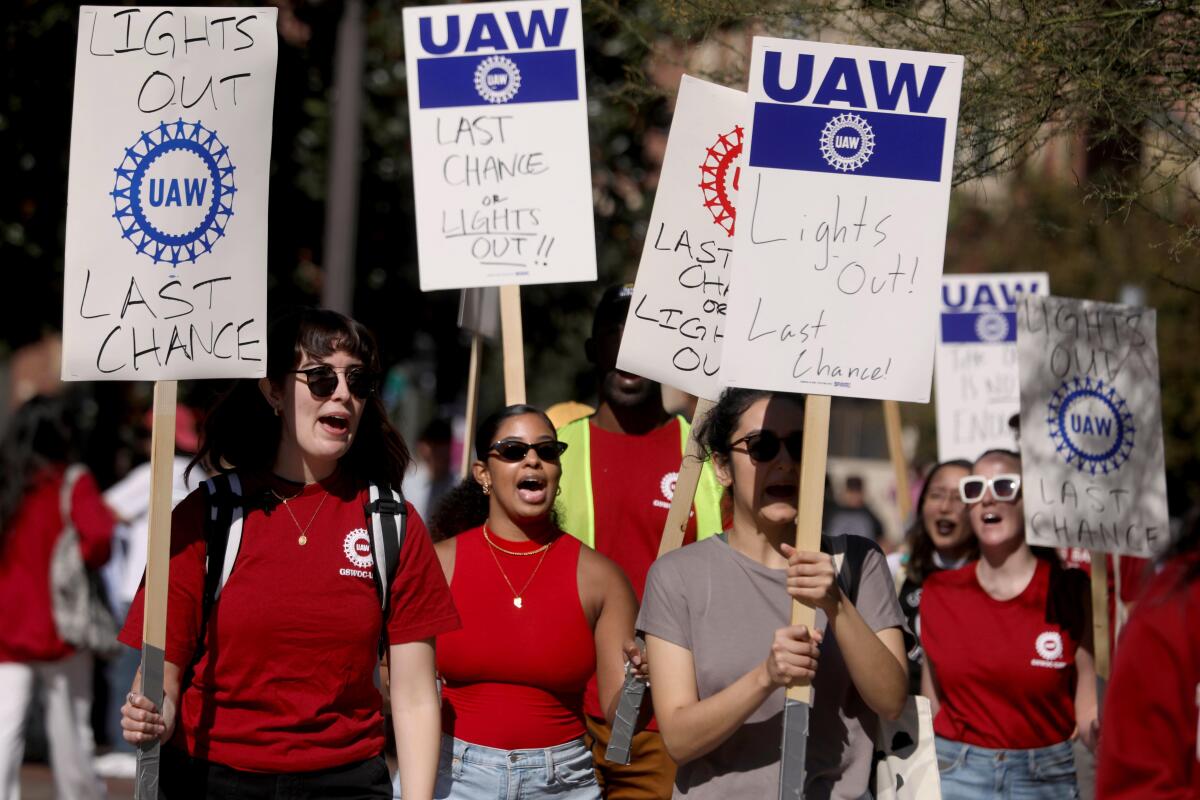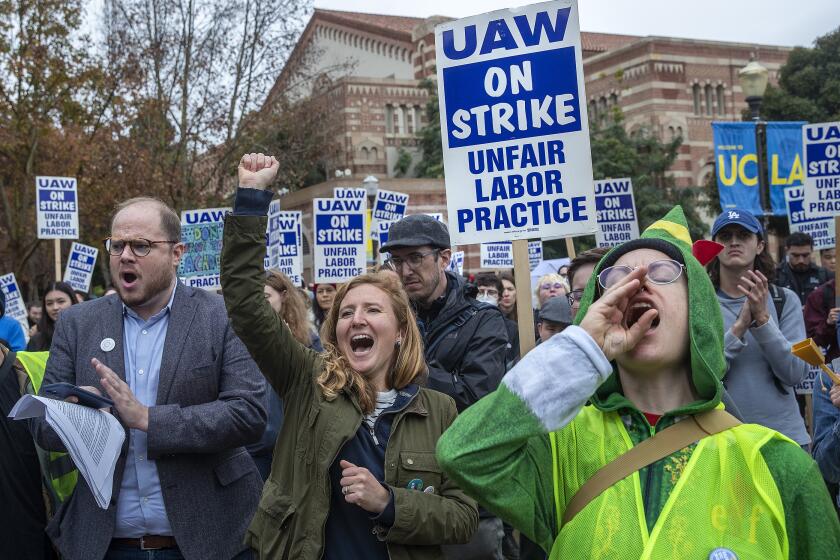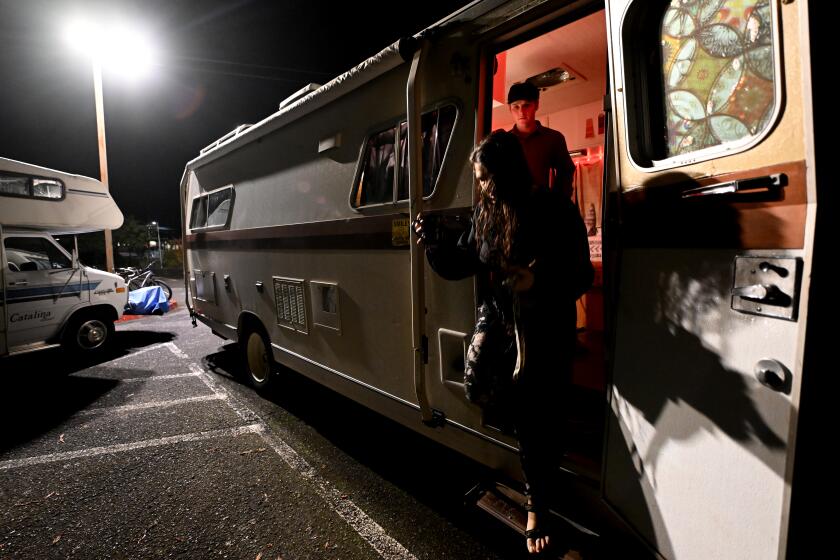USC and graduate students union reach tentative pact with big pay boosts, bias protections

- Share via
USC and about 3,000 newly unionized graduate student workers who teach, grade and do research reached a tentative labor agreement Sunday evening with big pay boosts and antiharassment protections, averting a threatened Tuesday strike weeks before final exams.
The tentative pact — hammered out after more than six months of negotiations — would raise minimum wages for the lowest-paid academic workers from $35,700 a year to $40,000 beginning next year, establish the first ever grievance and arbitration process, offer child-care stipends and provide semesterlong parental leave and other benefits.
It represents “the best contract in the private sector of higher education, made possible by mass participation” from members of the Graduate Student Workers Organizing Committee — United Auto Workers, said Stepp Mayes, a fifth-year doctoral student in environmental engineering and bargaining team member. Union members are expected to vote on the agreement next week and will not strike.
“Graduate student workers’ first contract will improve the lives of thousands of workers at USC and create a culture of accountability,” Mayes said. “This agreement marks the beginning of a stronger USC.”
USC also hailed the agreement and commended the graduate student workers for their “reasoned, responsible” negotiations and campaign.
“Right from the beginning, it was our objective to come to a fair agreement that recognizes the value that we see in our graduate students and the contributions they make to our university,” said Andy Stott, vice provost for academic programs and dean of the graduate school. “What the contract represents is the level of USC’s commitment to graduate education and the fact that we are a premier doctoral institution.”
USC teaching assistants, research assistants and assistant lecturers voted to form their first ever union in February, part of an unprecedented surge of labor organizing among academic workers across the nation. A historic strike last year by 48,000 University of California teaching assistants, tutors, researchers and postdoctoral scholars brought substantial gains in pay and benefits and helped energize fellow academic workers to step up union activism at their campuses.
The massive and successful strike by University of California academic workers has helped energize an unprecedented surge of labor organizing among their peers nationwide.
Like their peers at UC and other institutions, the USC academic workers said that high housing costs in Los Angeles made it extremely difficult to make ends meet on their current stipends. A union survey found that 88% of graduate student workers were “rent-burdened,” paying more than 30% of their income for housing costs, with an average of 54%.
Mayes said he pays $1,700 a month, or 70% of his income, for a small one-bedroom apartment in West Adams. Jacqueline Johnson, a fifth-year doctoral student in cinema and media studies, says she pays $1,400 in rent, or nearly half her monthly income, and saves money by forgoing a car — yet that forces her to rely on sometimes unreliable public transportation. José Múzquiz, a doctoral student in political science and international relations, has begun to house-sit to eliminate housing costs, which had created such financial pressures he used food banks to have enough to eat.
Anand Balakrishnan, a sixth-year doctoral candidate in computer science, said he had been paying $1,200 monthly for a shared two-bedroom apartment near USC. But rent increases and high inflation have forced him to move to a cheaper apartment, cut down on eating out, drive up his credit card debt and finally ask his parents for financial help.
As they organized a union, Mayes said the USC graduate student workers pored over contracts forged at UC and other institutions to shape their demands. The union’s demand for an independent arbitrator to handle discrimination and harassment complaints, for instance, was buttressed by similar provisions in place at UCLA, the University of Washington and New York University. USC insisted that complaints be first processed under the university’s internal Title IX office — which many students said they mistrusted because of delays and other deficiencies.
In the compromise, USC agreed to meet with complainants and their representatives within 90 days of a complaint being filed to discuss both interim measures and grievance resolution, Mayes said. The university also agreed to what Mayes called “industry-leading transparency standards” regarding reporting on the number of claims filed, their status and the duration of the investigation. Peer-led training on preventing harassment and discrimination will also be launched.
The new provisions are in addition to USC’s current Policy on Prohibited Discrimination, Harassment, and Retaliation, which a USC spokesperson called “a model for best practices in higher education,” providing clear paths for reporting prohibited conduct, responding to it and giving feedback on the policy and process.
Cal Poly Humboldt students living in their vehicles amid a severe housing crisis found community in campus parking lot G11. But when the university ordered them off campus, their sense of safety was sundered.
On pay, USC academic workers receive stipends at different minimum levels depending on the school they are employed by. Under the tentative agreement, those at the lowest level of $35,700 would receive a 12% increase to $40,000 in 2024-25 and others at higher levels of pay would get a 4.5% increase. All workers would receive a minimum 3% raise in 2025-26 and in 2026-27, along with a signing bonus of more than 1%.
The tentative pact would provide a 25% increase over four years for the lowest-paid workers, compared with what USC called a “not economically practical” initial union demand of 35%.
“USC Graduate School is charged with ensuring the success of all students, not only the 2,700 represented by the union,” the university posted on its website. “While providing competitive benefit and stipend packages for our graduate student workers, we must also invest in other areas of the graduate school, ensure we are achieving our academic and research goals, and support the broader university community.”
The two sides agreed to ask the National Labor Relations Board to decide the contested issue of how many graduate student workers may be included in the bargaining unit. The union initially asserted that 3,200 students should be counted while USC says 2,700.
USC also agreed to stronger protections for international students, including a fund to aid those who lose their visa status during their appointment.
Balakrishnan, an international student from India, said those protections, along with the stronger anti-harassment policies, were a huge relief.
“These are big things, for as an international student, the constant sort of fear that we have is that we lose our student status out of nowhere, and then we just have to pack up and leave — which is really scary,” he said. “But if we have a strong protection for this along with the nondiscrimination article, then we can be a lot more confident.”
More to Read
Sign up for Essential California
The most important California stories and recommendations in your inbox every morning.
You may occasionally receive promotional content from the Los Angeles Times.













